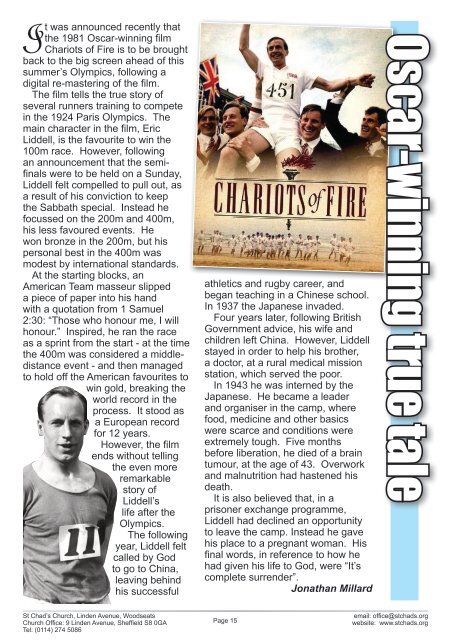You also want an ePaper? Increase the reach of your titles
YUMPU automatically turns print PDFs into web optimized ePapers that Google loves.
It was announced recently that<br />
the 1981 Oscar-winning film<br />
Chariots of Fire is to be brought<br />
back to the big screen ahead of this<br />
summer’s Olympics, following a<br />
digital re-mastering of the film.<br />
The film tells the true story of<br />
several runners training to compete<br />
in the 1924 Paris Olympics. The<br />
main character in the film, Eric<br />
Liddell, is the favourite to win the<br />
100m race. However, following<br />
an announcement that the semifinals<br />
were to be held on a Sunday,<br />
Liddell felt compelled to pull out, as<br />
a result of his conviction to keep<br />
the Sabbath special. Instead he<br />
focussed on the 200m and 400m,<br />
his less favoured events. He<br />
won bronze in the 200m, but his<br />
personal best in the 400m was<br />
modest by international standards.<br />
At the starting blocks, an<br />
American Team masseur slipped<br />
a piece of paper into his hand<br />
with a quotation from 1 Samuel<br />
2:30: “Those who honour me, I will<br />
honour.” Inspired, he ran the race<br />
as a sprint from the start - at the time<br />
the 400m was considered a middledistance<br />
event - and then managed<br />
to hold off the American favourites to<br />
win gold, breaking the<br />
world record in the<br />
process. It stood as<br />
a European record<br />
for 12 years.<br />
However, the film<br />
ends without telling<br />
the even more<br />
remarkable<br />
story of<br />
Liddell’s<br />
life after the<br />
Olympics.<br />
The following<br />
year, Liddell felt<br />
called by God<br />
to go to China,<br />
leaving behind<br />
his successful<br />
athletics and rugby career, and<br />
began teaching in a Chinese school.<br />
In 1937 the Japanese invaded.<br />
Four years later, following British<br />
Government advice, his wife and<br />
children left China. However, Liddell<br />
stayed in order to help his brother,<br />
a doctor, at a rural medical mission<br />
station, which served the poor.<br />
In 1943 he was interned by the<br />
Japanese. He became a leader<br />
and organiser in the camp, where<br />
food, medicine and other basics<br />
were scarce and conditions were<br />
extremely tough. Five months<br />
before liberation, he died of a brain<br />
tumour, at the age of 43. Overwork<br />
and malnutrition had hastened his<br />
death.<br />
It is also believed that, in a<br />
prisoner exchange programme,<br />
Liddell had declined an opportunity<br />
to leave the camp. Instead he gave<br />
his place to a pregnant woman. His<br />
final words, in reference to how he<br />
had given his life to God, were “It’s<br />
complete surrender”.<br />
Jonathan Millard<br />
Oscar-winning true tale<br />
St Chad’s Church, Linden Avenue, Woodseats<br />
Church Office: 9 Linden Avenue, Sheffield S8 0GA<br />
Tel: (0114) 274 5086<br />
Page 15<br />
email: office@stchads.org<br />
website: www.stchads.org


















